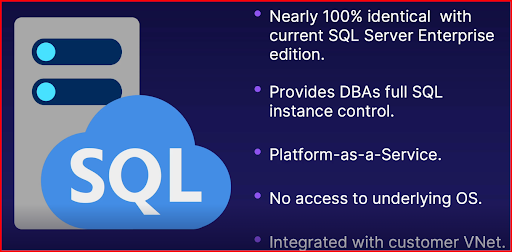Microsoft SQL Server databases
in Azure ecosystem
Microsoft collectively refers to these different options as the Azure SQL service family.
There are 3 deployment options:
- Running SQL Server on an Azure virtual machine
- The Azure SQL Database service,
- The Azure SQL Managed Instance service.
1. Running SQL Server on a virtual machine
- It provides 100% compatibility with any version of SQL Server that you might be using on-prem, which extends to the usual options for interacting with the server's operating system.
- This is an infrastructure-as-a-service offering.
- While administrators have full control of the operating system and the services that they choose to install,it also means they're responsible for maintaining and securing that operating system, as well as optimizing performance for their application.
- Deploying SQL Server on infrastructure-as-a-service provides increased control at the cost of increased management.
- Azure has responsibility for managing, maintaining, and securing the underlying virtual machine and virtual network services, what the customer does with those services is entirely their responsibility to manage.
2. Azure SQL Database service.
- Azure SQL Database is a platform-as-a-service offering.
- Azure handles more of the boring server stuff, allowing us to focus on the database and what we want to do with it.
- We can get an Azure SQL database provisioned with minimal server-level configuration. T
- There's is still a logical server and it is important.
- Setting up Azure SQL databases and servers is extremely fast and simple.
- Unlike databases and traditional SQL Server installations, hardware resources like CPU, memory, and disk performance aren't a server-level factor.
- Configuration is applied directly to each Azure SQL database and is easily reconfigurable if the performance needs of your database change.
- Optionally, databases with varying resource needs may be organized into pools, where collective pool-level resources are allocated to pool member databases as needed.
- Azure SQL platform-as-a-service options reduces management overhead and increases operational flexibility by letting go of lower-level control, your time is free to focus on the aspects of your deployment that are more pertinent to your organization.
3. Azure SQL Managed Instance service.
- Managed instances are intended to be nearly 100% identical to an on-prem SQL Server running the current enterprise edition.
- This offering provides DBAs full control over an SQL Server instance, not just a single database.
- Managed instances are a platform-as-a-service offering,
- The customers have no visibility or access to the underlying operating system.
- I don't have to spend any time taking care of that operating system.
- Like a virtual machine, managed instances must be integrated into the customer's virtual network infrastructure.
SQL database solutions in Azure that are not based on Microsoft SQL. While you can always install what you like on a virtual machine, Azure does provide platform-as-a-service offerings for popular open source relational databases, Azure Database for MariaDB, for MySQL, and for PostgreSQL.
Reference:
What is Azure SQL? - Azure SQL | Microsoft Learn
Azure SQL documentation - Azure SQL | Microsoft Learn





No comments:
Post a Comment